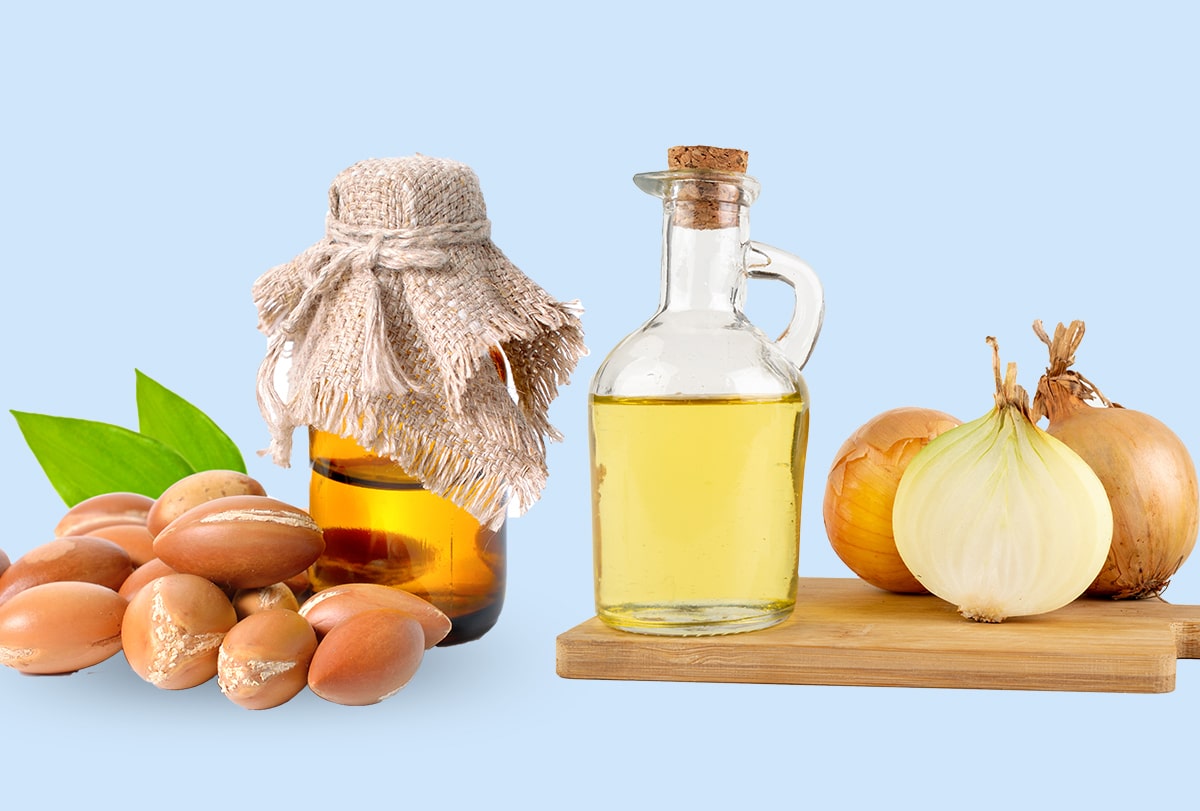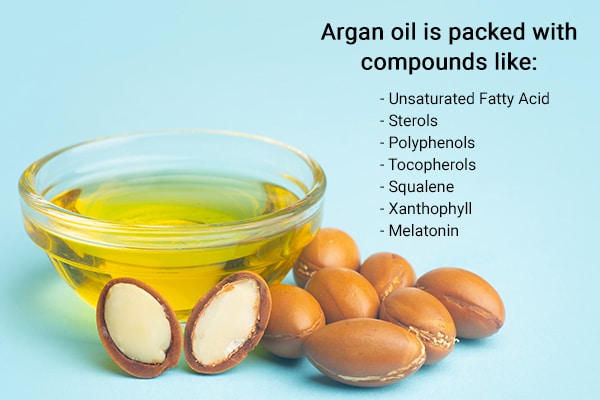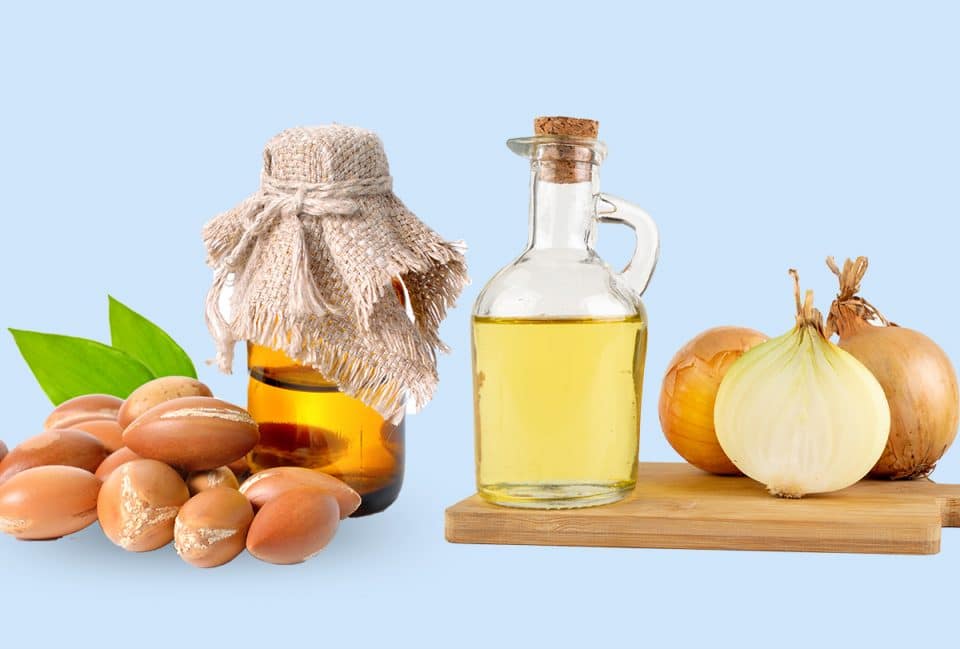Herbal cosmetics and drugs are thriving because of their rising market demand around the globe. This is because of their minimal or zero side effects, which are hard to find in the chemical-filled world of cosmetics and pharmaceuticals.

Oils have been put to use in formulations specifically for skin care and hair care treatment. Cosmetics, independently, are not enough to ensure proper care of the skin and hair. Products that contain active ingredients are needed to limit any hair or skin damage.
Such active ingredients can be found in herbal oils such as argan oil and onion oil. These active ingredients can also be used in dealing with various health issues.
Although all herbal oils are beneficial for you, some may be better than others in specific cases.
Take a look at the therapeutic profile of argan oil and onion oil. What benefits do they have on your hair and skin? When and how do you use them?
Read more to find the answers to such questions.
Argan Oil or Onion Oil: Which Is Better?
Argan oil
The argan tree has numerous uses. Its various parts or products such as leaves, fruits, and oil are a source of nutrients and biologically active chemical constituents that have nutritional and cosmetic benefits.
Argan oil is packed with compounds such as:

To expand on the chemical composition of argan oil, you should know that argan oil comprises roughly 80% of unsaturated fatty acids, making it the oil’s major component. Oleic acid and linoleic acid are the primarily found unsaturated fatty acids in argan oil. (1)
Onion oil
Onion is biologically called Allium cepa and it belongs to the plant family Amaryllidaceae. It is a prominent spice around the planet and is the source of innumerable plant compounds, such as: (2)
- Polyphenols
- Phenolic acids
- Flavonoids (such as fisetin and quercetin)
- Ascorbic acid
- Sulfur compounds
Comparing argan oil and onion oil
Due to its chemical components that include fatty acids and polyphenols, among others, argan oil has arisen as a significant component of multiple cosmetic (hair and skin care) products. (3)
In addition, argan oil contains sterols, a chemical class with strong biological activity due to its antioxidant properties that promote hair and skin health. (1)
On the other hand, due to its abundance of polyphenols, onion is considered valuable for skin health as it can help hydrate, smooth, soften, and soothe the skin. (4)
Onion is also rich in sulfur, which is highly concentrated in the hair, skin, and nails, making it great for skin and hair health. (5)
In short, both argan oil and onion oil are beneficial for skin and hair health due to their unique chemical constituents. Ultimately, experimenting with both oils can help you determine which one is best for you.
However, onion oil may cause a tingling or burning sensation on the skin, which is its major side effect, whereas argan oil is more soothing and doesn’t cause any tingling sensation. So, for sensitive skin and sensitive scalp, opt for argan oil.
Hair Benefits of Argan Oil and Onion Oil
These are the benefits of argan oil and onion oil on your hair.
| Hair Benefits of Argan Oil | Hair Benefits of Onion Oil |
|---|---|
| Prevents dandruff | Promotes hair growth |
| Improves hair elasticity | Fights hair loss |
| Prevents graying of hair | Nourishes hair |
| Keeps the hair hydrated | Regenerates hair follicles |
| Fights hair loss | Reduces inflammation |
Hair uses of argan oil
These are the uses of argan oil on hair.
1. Prevents hair issues such as dandruff
Sebostatics are compounds that inhibit the excessive production of sebum, which can be a leading cause of many hair problems such as: (6)
- Dandruff
- Seborrheic dermatitis
- Itchy scalp
- Pruritus
- Inflammation
The high oleic acid levels in argan oil have been established to regulate sebum production, which is necessary for a healthy scalp and hair. (3)(7)
2. Moisturizes hair
Argan oil has an extremely promising water-holding capability, which makes it perfect for moisturizing your hair. Maintaining the hair’s hydration is necessary for healthy-looking strands. (3)(8)
3. Increases hair elasticity
Topical use of argan oil results in a substantial increase in gross elasticity, net elasticity, and biological elasticity of the hair. Good hair elasticity is one of the symbols of hair strength and health. (3)
4. Prevents hair loss and graying
Research has provided evidence that defends the theory that oxidative stress plays a prominent part in the aging cycle. Aging of hair means a decrease in melanocyte function, which is necessary for hair color, and this decline leads to graying of hair.
Aging also manifests itself as an increase in hair loss or alopecia. There is inferred evidence that oxidative stress may be a key means that contributes to hair graying and hair loss. (9) Therefore, protecting hair from oxidative stress and damage means protecting it from graying and hair loss.
In the last few years, argan oil has attained a high stake in hair care products.
In a study, protein loss was measured after oxidative damage to indicate the preventive effect of argan oil on human hair. Hair that was pretreated with argan oil before experiencing oxidative damage showcased much lower protein loss than hair that wasn’t given the argan oil treatment.
The study concluded that argan oil was effective in defending the hair against oxidative damage. (10)
5. Protects hair after treatment with hair dyes
If you’re planning to dye your hair, you may need to first be friends with argan oil. Oxidative dyes may harm the hair because of the chemicals they contain that modify the structure of the hair and, therefore, cause changes in its mechanical and surface properties.
Research has shown that argan oil may have hair-protective activity post-treatment with hair dyes. This effect can be achieved by the addition of argan oil to the conditioner or the base hair care product that is used after dying the hair to reduce protein loss in hair. (11)
Hair uses of onion oil
These are the uses of onion oil for hair care.
1. Fights hair loss and alopecia
Alopecia is a hair loss disorder that affects every hair-bearing surface.
A study was specifically organized to verify the efficacy of hair regrowth by topical onion juice in the treatment of alopecia. The patients were instructed to use topical onion treatment 2 times every day for 2 months.
Regrowth of terminal hair began after only 2 weeks of treatment with onion juice. In the 4th week, hair regrowth was seen in more than 50% of the patients, which increased to around 90% of patients at 6 weeks.
The study exhibited that the application of onion juice has the potential to greatly promote hair regrowth and can be a promising topical treatment for alopecia areata. (12)
2. Nourishes hair and promotes hair growth
Onions have healing actions on hair with their antibacterial, cleansing, and nourishing activities. Onions are rich in a number of vital minerals and vitamins including:
- Vitamin C
- Vitamin B6
- Calcium
- Magnesium
- Potassium
- Germanium
Onions are also packed with sulfur, which is a mineral present in all cells of your body, with its highest concentration in the hair, skin, and nails. Sulfur has been referred to as the beauty mineral because it stimulates circulation and reduces inflammation.
Based on this, there are theories that sufficient amounts of sulfur can give a head start to hair growth. The considerable amounts of sulfur in onions make them immensely good for regenerating hair follicles, promoting hair regrowth, and restoring hair health. (5)
Skin Care With Argan Oil and Onion Oil
These are the benefits of argan oil and onion oil on your skin.
| Skin Benefits of Argan Oil | Skin Benefits of Onion Oil |
|---|---|
| Improves skin barrier function | Reduces scarring after wound healing |
| Promotes skin hydration | Promotes skin hydration |
| Decreases wrinkle formation | Has antiaging action |
| Improves skin elasticity | Improves skin elasticity |
| Treats burns | Alleviates redness and inflammation |
Argan oil for skin
Argan oil comprises monounsaturated and saturated fatty acids with other chemical constituents including polyphenols, tocopherols, sterols, and squalene, which offer a lot of therapeutic benefits.
Conventionally, argan oil has been used in the treatment of skin infections and as an ingredient in skin care products. The various uses of argan oil on the skin include: (8)(1)
- Everyday topical use of argan oil has been demonstrated to improve skin elasticity and offer anti-aging effects. (13)
- Argan oil can maintain skin hydration by preserving the skin barrier function and retaining the skin’s water-holding capacity.
- Topical applications of argan oil on the skin can have a softening and relaxing effect on the skin.
- Argan oil has been studied to be useful in making better second-degree burns in animal models.
- Argan oil has been argued to heal all types of skin disorders with a special efficacy for juvenile acne and chickenpox.
- Argan oil is also said to decrease the formation of wrinkles.
- Argan oil is commonly employed in cosmetics as a moisturizer.
All these skin benefits and healing actions of argan oil validate its wide use in dermatological and cosmetic developments. Moreover, studies have shown that using argan oil on the skin does not have any known side effects. (13)
Onion oil for skin
Onions have been used in traditional medicine for thousands of years worldwide.
- Diminish skin scarring: Prompt wound healing without evident scarring is a significant part of dermatology. Skin wounds happen due to surgical operations or accidentally from injuries. Studies show that onion extract contains many unique bioflavonoids, such as quercetin, kaempferol, and cepalin, which are useful for improving the overall appearance of wounds by improving the texture, smoothness, redness, and softness of the gel-treated scars. (14)
- Reduce skin inflammation: In humans, local application of onion juice can greatly decrease allergic skin inflammation responses. Some studies have pointed out that onions can be helpful in alleviating skin redness and irritation. (15)(4)
- Provide soothing and hydrating effects on skin: Onions are rich in polyphenols, and plant polyphenols are deemed significant for skin function because of their hydrating, smoothing, softening, and soothing effects. Polyphenols hinder the action of enzymes in the skin that cause the breakage of collagen, elastin fibers, and hyaluronic acid. Also, they subdue irritation, decrease skin redness, and improve skin elasticity. (4)
- Provides antiaging effects: Useful antiaging constituents in food include substances that play roles in the synthesis and metabolism of skin components while inhibiting the breakdown of skin components to maintain the skin’s integrity. One such ingredient is quercetin, a flavanol present in onion skin. This points to the potential use of onion oil in fighting skin aging. (4)
Possible side effects of onion oil on skin
According to a study, onion extract gel was generally well tolerated on the skin with no major side effects reported. (14)
However, a small number of participants experienced mild itching, burning, stinging, or contact dermatitis at the site of application. But they resolved by themselves and were not severe enough to cause anyone to stop using the product. (14)
It’s important to be aware of these potential side effects and to discontinue use if you experience any discomfort or adverse reactions.
How to Use Argan Oil and Onion Oil
Here are step-by-step instructions for using argan oil and onion oil for hair and skin.
Argan oil for hair
- Take 8–10 drops of argan oil in your hands and gently massage it into your scalp for 10 minutes, making sure to cover your hair from roots to ends. Leave the oil in your hair overnight, and wash it off the next morning.
- Alternatively, you can add argan oil to your shampoo to achieve added hair volume and shine. (1)
Argan oil for skin
- Cleanse your face. Take a few drops of argan oil on a cotton ball or pad, and apply it all over your face. Use cosmetic argan oil, which is specifically designed for use on the skin.
- You can also use creams containing argan oil on your skin twice a day.
Onion oil for hair
- Take a few drops of onion oil in your palms, and massage it into your scalp for around 10 minutes.
- Leave the oil in your hair overnight and wash it off the following day.
Onion oil for skin
- Mix onion oil with lavender oil or olive oil. Apply the mixture to your skin, and let it sit for around 10 minutes before rinsing it off or wiping it off with a cotton ball.
- Alternatively, you can mix onion oil with yogurt to make a paste that you can use on your skin.
Word of Caution
Here are some precautions to keep in mind when using onion oil and argan oil:
- To avoid irritation, it’s a good idea to do a patch test by applying a small amount of the oil on your skin to check for signs of irritation before using it all over your face or body.
- When purchasing onion oil or argan oil, it’s important to choose a high-quality product from a reputable source. Lower-quality oils may be less effective or even contain harmful additives.
- While argan oil is made from the nut of the argan tree, allergic reactions to the oil are uncommon. (16) However, if you have a nut allergy, it’s still a good idea to consult a professional and use argan oil with caution.
- Always exercise caution when trying new products, especially if you have sensitive skin or allergies.
- If you experience adverse reactions, such as redness, itching, or swelling, it’s best to discontinue use and seek medical advice.
Most-Asked Questions
How to extract onion oil at home?
To extract onion oil at home, pick a few fresh onions, chop them, and grind them nicely. Mix this paste with coconut oil and store the mixture in a container for use.
Can I leave onion oil on my hair overnight?
Yes. According to dermatologists, it is safe to leave onion oil on hair overnight.
Is there any difference between skin-grade and food-grade argan oil?
Based on the technique used on argan kernels, two different kinds of argan oil can be extracted. These are termed food-grade and cosmetic-grade argan oils. Cosmetic-grade argan oil is acquired from unroasted kernels, but food-grade argan oil is attained by pressing roasted kernels.
Cosmetic-grade argan oil is developed in such a way that it can be used directly on the skin or hair. It can also be incorporated as an ingredient in cosmetic products. (1)
Final Word
Herbal oils have a rising demand in the market for herbal cosmetics. They are biologically derived and have wide use because of their chemical composition.
Many researchers have assessed the efficacy of their bioactive components for use in cosmetics, mainly in both hair and skin care. Two such oils are onion oil and argan oil, which have a rich therapeutic profile. They are packed with great nutrients with beneficial actions on the skin and hair.

